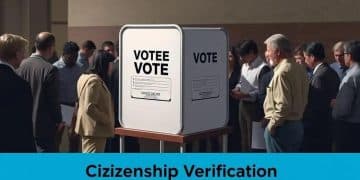New bill passed by House mandates citizenship verification for voting

Anúncios
The new bill passed by the House mandates citizenship verification for voting, aiming to enhance election integrity, but raises concerns about potential voter suppression and legal challenges.
The recent new bill passed by House mandates citizenship verification for voting, stirring discussions about its impact on voters. What does this mean for the electoral process and who might be affected?
Anúncios
Understanding the new bill’s main provisions
The new bill passed by the House introduces key provisions that significantly change the landscape of voting in the United States. Understanding these provisions is crucial for voters and lawmakers alike.
Main Provisions
This bill focuses on implementing citizenship verification as a prerequisite for voting. This means that individuals must prove their citizenship status to register and vote, adding a layer of complexity to the electoral process.
Anúncios
Verification Process
Voters will now be required to provide specific documentation to confirm their citizenship. This could include:
- A valid U.S. passport
- A birth certificate
- Naturalization documents
While these measures aim to enhance election integrity, they may also create barriers for some eligible voters.
Another significant aspect of the bill is the potential for increased audits of voter registrations. This could mean that states may conduct more frequent checks to ensure that voters are properly registered and that their citizenship status is verified. These audits could lead to delays in the registration process and reduce the number of voters who can participate in upcoming elections.
Who Will Be Affected?
The implications of this bill will be felt across diverse communities. For instance, non-English speaking citizens might face challenges navigating the verification process. Additionally, individuals with limited access to the necessary documents might find it increasingly difficult to vote. This raises important questions about equity in the electoral process.
In summary, the new measures implemented by the House are designed to promote election integrity, but they also present challenges that could disenfranchise certain groups of voters. Understanding these provisions is essential for everyone involved in the voting process.
Implications of the citizenship verification requirement
The citizenship verification requirement set by the new bill brings several implications for voters and the electoral process. This requirement aims to ensure that all voters are citizens, but it also raises various concerns.
Potential Challenges
One major concern is the potential barriers that this verification process may create. Citizens may struggle to provide the necessary documentation, which can disproportionately affect marginalized communities. It is vital to recognize that while this bill seeks to enhance election integrity, it could also hinder many eligible voters.
Impact on Voter Turnout
Studies show that measures like this can lead to decreased voter turnout. When voters face extra hurdles, such as proving citizenship, they might choose not to participate in elections. This could undermine the democratic process and skew election results.
Legal and Political Ramifications
Moreover, the implementation of this requirement is likely to spark legal challenges. Advocacy groups are expected to contest the bill in courts, arguing that it infringes on voting rights. Lawsuits may point to the discriminatory effects of such requirements, highlighting how they disproportionately impact specific populations.
States adopting these verification measures must also be prepared for the administrative burden they will face. Ensuring compliance with the new law could be costly and complex, potentially stretching resources thin. Election officials need to train staff and develop systems that accurately check citizenship status without causing delays in the voting process.
The citizenship verification requirement thus introduces layers of complexity for both voters and election officials. Understanding these implications is essential for navigating the changes in the electoral landscape.
Reactions from various political parties

The new bill has evoked a range of reactions from different political parties. Each party is weighing the implications and how it aligns with their values and goals.
Democratic Party Response
Many Democrats have expressed strong opposition to the citizenship verification requirement, arguing that it poses an unfair barrier to voting. They believe this measure disproportionately affects marginalized communities, particularly minorities and low-income individuals. Some party members describe the bill as a tactic to suppress voter turnout.
Republican Party Perspective
In contrast, Republicans generally support the new verification requirement, viewing it as a necessary step to ensure election integrity. They argue that proving citizenship is essential to prevent fraud and maintain trust in the democratic process. This bill aligns with their broader agenda of stricter voting regulations.
Independent and Third Party Views
Independent and third-party voices have also made their positions clear. Some independent representatives argue that the bill complicates the voting process and may lead to disenfranchisement. They advocate for systems that enhance accessibility while preserving integrity. This reflects a nuanced view that seeks to balance regulation with rights.
The public’s response has also been mixed, influencing how political parties shape their narratives around this bill. Various advocacy groups are mobilizing to challenge the bill in court, which may lead to further political action. As debates continue, the atmosphere surrounding this legislation remains charged and divisive.
Understanding these reactions is critical for voters who want to gauge how this bill might affect future elections and what it signifies for the political landscape in the United States.
Impact on voter turnout and engagement
The new bill requiring citizenship verification has significant implications for voter turnout and engagement across the country. As this bill takes effect, it’s important to understand how it might influence people’s ability to vote.
Effects on Participation
One major concern is that this new requirement may discourage eligible voters from participating in elections. When individuals face additional hurdles, it can lead to feelings of frustration and confusion. Many potential voters may not fully understand the verification process, leading them to opt out of voting altogether.
Barriers to Access
For some people, obtaining the necessary documentation to prove citizenship can be a tedious task. This is especially true for individuals with limited access to resources or those who may not have the required documents readily available. The challenges in meeting these new requirements can disproportionately affect low-income and marginalized communities.
- The need for specific documentation can create confusion.
- Some eligible voters may not know they need to verify citizenship.
- Time and costs associated with obtaining documents can deter participation.
Furthermore, studies indicate that voter turnout often decreases when new voting regulations are introduced. For instance, states that have passed restrictive voter ID laws have seen drops in participation rates. Therefore, there are serious concerns that the citizenship verification requirement could lead to similar results.
Engagement is also critical. When people feel that the voting process is accessible, they are more likely to participate in multiple elections. However, the fear that their citizenship status could be questioned may create a sense of alienation and disengagement from the political system.
As citizens consider the implications of this bill, it becomes essential to address these barriers. Ensuring that everyone understands their voting rights and the processes involved can help mitigate the potential negative impact on voter turnout and engagement.
Legal challenges anticipated from the new law
The new law mandating citizenship verification is expected to face several legal challenges. As legal experts analyze the provisions, it becomes clear that many advocates and organizations are preparing to contest its constitutionality.
Grounds for Legal Challenges
Opponents of the law argue that it infringes on voting rights guaranteed by the Voting Rights Act and other constitutional protections. They claim that requiring additional documentation to vote is discriminatory and can disproportionately affect minorities, the elderly, and low-income individuals.
Key Concerns Raised
Some of the main concerns that advocates are likely to raise in court include:
- The potential for voter suppression
- Claims of unequal access to the necessary documentation
- Arguments about the ambiguous definition of “citizenship” in the context of the law
Legal actions may stem from not only advocacy groups but also state governments that oppose the law. Conflicts may arise over how the law is implemented and the resources allocated for compliance and enforcement.
Furthermore, cases related to voting rights have shown a history of being brought before the courts, often resulting in significant rulings that impact the electoral process. For instance, similar laws in other states have been struck down or modified due to successful legal challenges.
These ongoing legal battles can create uncertainty in the electoral process. As challenges unfold, states may halt implementation or make adjustments to comply with legal findings. This can disrupt how elections are conducted and cause confusion among voters.
Understanding the potential for legal challenges is essential for voters and advocates alike as they navigate this new landscape in voting regulations.
In conclusion, the new law mandating citizenship verification for voting brings a significant shift to the electoral landscape. While its intention is to enhance election integrity, many challenges come with its implementation. The law faces fierce opposition from various political parties and advocacy groups, highlighting concerns about potential voter suppression and discrimination. The expected legal battles may further complicate the situation, causing confusion among voters. It is crucial for all citizens to stay informed about these developments as they can greatly impact voting rights and access to the electoral process.
FAQ – Questions about the new citizenship verification law for voting
What is the main purpose of the new citizenship verification law?
The main purpose of the new law is to ensure that only U.S. citizens can participate in elections, aiming to enhance election integrity.
How might this law affect voter turnout?
The law may discourage eligible voters from participating due to the added requirement of proving citizenship, potentially leading to lower voter turnout.
What reactions have political parties shown regarding this law?
Political parties have shown mixed reactions, with Democrats generally opposing it and Republicans supporting it for its focus on election integrity.
What legal challenges are expected in response to this law?
Many advocacy groups and organizations plan to challenge the law in court, arguing that it could lead to voter suppression and discrimination.






